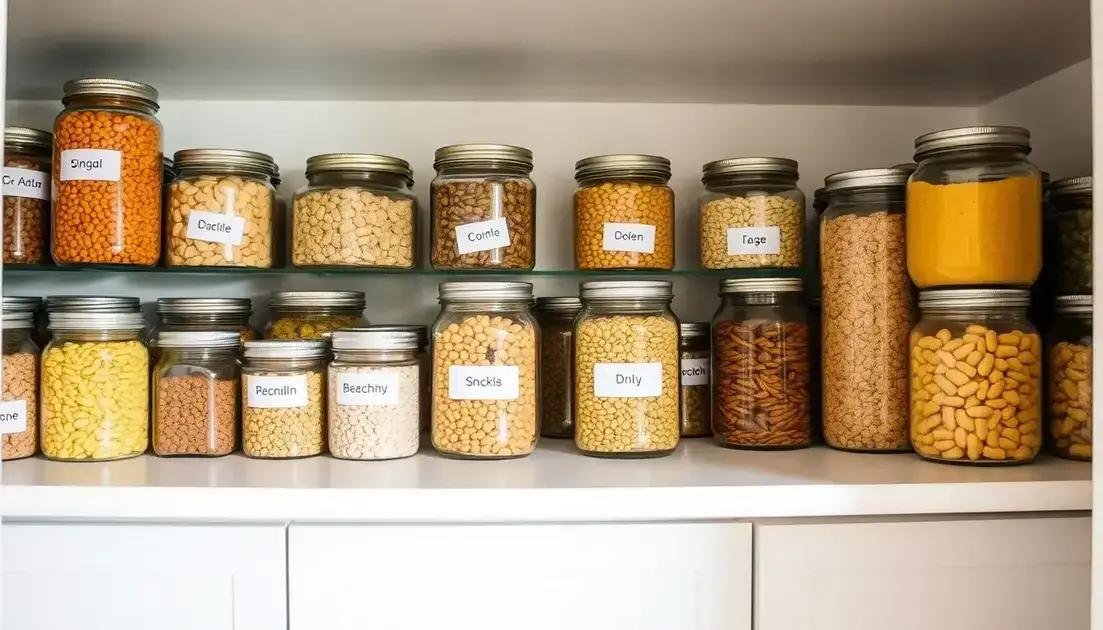
Discover the Secrets: 5 Popular Diets for Effective Weight Loss Tips
-
Maria Duarte
-
20, janeiro, 2025
Topics
 Shared
Shared
Are you looking to shed some pounds? Understanding How to Lose Weight through popular diets is essential.
In this post, we delve into five proven plans: the Ketogenic, Mediterranean, Paleo, Atkins, and Vegan diets.
Each offers unique benefits and appeals to different lifestyles.
Let’s explore these strategies to help you find the best fit for your weight loss journey.
Introduction to Weight Loss Strategies
Weight loss tips can greatly assist you in achieving your health goals.
Focus on a balanced diet that includes fruits, vegetables, whole grains, and lean proteins.
Incorporate regular exercise into your routine, aiming for at least 150 minutes of moderate aerobic activity each week.
Maintain a caloric deficit by consuming fewer calories than you burn.
Dietary Swaps
Make simple dietary swaps, such as choosing whole grains over refined grains.
Set realistic goals and track your progress to stay motivated.
Understanding the Importance of Diets

Understanding the Importance of Diets is crucial for effective weight loss. A well-structured diet provides your body the essential nutrients needed for overall health. It helps maintain a healthy weight by regulating calorie intake and promoting metabolic function. Various diets cater to individual preferences and lifestyle needs, making it easier to adopt nutritional habits that are sustainable over time.
Additionally, awareness of different diets empowers individuals to make informed choices. For instance, understanding how macronutrients work helps in balancing proteins, fats, and carbohydrates within your meals. Being informed leads to better eating patterns, reduced intake of processed foods, and a clearer understanding of portion control.
When selecting a diet, consider your personal goals, food preferences, and any health conditions. This consideration ensures that long-term adherence to your diet plan is possible. Remember, successful weight loss is about consistency and making informed choices that align with your lifestyle!
Overview of the Ketogenic Diet
The Ketogenic Diet focuses on high fat and low carbohydrate intake. When carbohydrates are restricted, the body enters a metabolic state known as ketosis. In this state, the body becomes efficient at burning fat for energy instead of glucose from carbs.
This diet typically consists of approximately 70% fats, 25% protein, and only 5% carbohydrates. Foods such as avocados, nuts, seeds, and oils are staples, while pasta, sugar, and bread are avoided.
Many people find that the ketogenic diet aids in weight loss, as it often reduces hunger and cravings. Additionally, it has potential benefits for certain medical conditions, such as epilepsy and type 2 diabetes, due to its ability to stabilize blood sugar levels.
However, it’s important to consider potential side effects when adopting this diet, including fatigue or the “keto flu” in the initial phase as the body adjusts. Consulting with a healthcare professional before starting is recommended to ensure it’s a safe and suitable option for your individual health needs.
Exploring the Mediterranean Diet

The Mediterranean Diet emphasizes eating whole, minimally processed foods inspired by the traditional cuisines of countries bordering the Mediterranean Sea. This dietary approach is rich in fruits, vegetables, whole grains, beans, nuts, and seeds.
It also includes healthy fats, primarily from olive oil, and encourages a moderate intake of fish and poultry while limiting red meat and sweets. One of the key aspects of the Mediterranean diet is its balance of macronutrients.
It promotes heart health, as many studies show it can lower the risk of heart disease due to its high levels of omega-3 fatty acids and antioxidants.
Another benefit of this diet is its emphasis on lifestyle factors.
It’s not only about what you eat but also how you eat. Enjoying meals with family and friends, being physically active, and savoring food are essential components.
Research suggests that following the Mediterranean diet may also help with weight management and decrease the likelihood of chronic diseases like type 2 diabetes and Alzheimer’s.
Overall, this diet is more about adopting a healthy way of living than strictly counting calories.
Benefits of the Paleo Diet
The Paleo Diet, often termed the ‘caveman diet’, encourages eating foods presumed to be available to our prehistoric ancestors. This includes whole foods such as meats, fish, fruits, vegetables, nuts, and seeds. The focus is on foods that our bodies naturally process, avoiding refined sugars, dairy, grains, and legumes.
Some of the benefits of the Paleo Diet include:
- High-quality protein
- Healthy fats
- Promotes feelings of fullness
- Supports overall health and wellness
While the Paleo Diet can offer health benefits, its restrictive nature may not suit everyone. Consulting with a healthcare provider before making significant dietary changes is advisable to ensure it aligns with personal health goals.
The Science Behind the Atkins Diet

The Atkins Diet is a low-carbohydrate eating plan designed to promote weight loss and improve health, developed by Dr. Robert Atkins in the 1970s.
Phases:
Induction: This phase has a carb limit of 20 grams per day and focuses on protein and fat sources with the goal of entering ketosis.
Balancing: In this phase, more nutritious carbs like nuts and berries are slowly introduced.
Benefits:
The Atkins Diet offers several benefits, including:
- Greater short-term weight loss compared to low-fat diets.
- Decreased hunger levels.
- Improvement in triglyceride levels and HDL cholesterol.
Drawbacks:
However, there are also drawbacks to consider:
- Potential nutrient deficiencies.
- Adverse effects like constipation or fatigue.
Recommendation: It is advisable to consult with a healthcare professional before starting the diet.
Vegan Diet: Pros and Cons
Vegan Diet:
The Vegan Diet eliminates all animal products, including meat, dairy, and eggs. This diet is based on plant-based foods, such as fruits, vegetables, grains, nuts, and seeds.
Pros:
Health Benefits: Studies show that vegan diets may help lower the risk of heart disease, high blood pressure, and type 2 diabetes.
Weight Management: Many people find it easier to lose weight on a vegan diet due to the high fiber content and lower calorie density of plant foods.
Ethical Consideration: Choosing veganism supports animal welfare and reduces harm to animals.
Environmental Impact: A plant-based diet has a smaller carbon footprint compared to diets high in animal products.
Cons:
Nutrient Deficiencies: Vegans need to ensure they get enough vitamin B12, iron, calcium, and omega-3 fatty acids, which are more easily obtained from animal sources.
Social Challenges: Eating out or attending social events can be challenging for vegans due to limited options.
Initial Adjustment: Transitioning to a vegan diet may be difficult for some, as it requires planning and adjustment.
Conclusion: Understanding these pros and cons can help individuals determine if a vegan diet aligns with their health goals and values.
Tips for Choosing the Right Diet

Choosing the right diet is essential for successful weight loss. Start by assessing your lifestyle and preferences. Consider how much time you can dedicate to meal prep and cooking. Some diets are more flexible, while others require strict adherence to certain food groups.
Next, identify your health goals. Are you looking to lose weight, build muscle, or improve overall health? Knowing your objectives helps in selecting a diet that aligns with them. For instance, if you want to increase your intake of whole foods, a plant-based diet might suit you.
Additionally, research the nutritional content of potential diets. Ensure they provide essential nutrients to avoid deficiencies. Look for diets rich in fruits, vegetables, lean proteins, and healthy fats.
Consider sustainability. A diet should be realistic and enjoyable for you to maintain in the long run. If a diet feels like a chore, it might not be the best choice.
Lastly, consult with a healthcare professional or a registered dietitian. They can provide personalized advice based on your individual health needs and guide you toward a diet that supports your weight loss journey.
Common Misconceptions About Weight Loss
Misconceptions about nutrition can lead to unhealthy habits and poor dietary choices. Understanding the truth behind common myths is essential for maintaining a balanced diet.
Carbohydrates are important for energy, especially for physical activity. They provide the fuel needed for workouts and daily activities.
Skipping meals can slow down metabolism and lead to overeating later; smaller, balanced meals are better for maintaining energy levels and preventing hunger spikes.
Healthy Fats
Healthy fats from nuts, avocados, and olive oil are essential for a balanced diet. They support cell function and help absorb vitamins.
Diets that promise quick results often fail. Sustainable weight management involves long-term changes rather than temporary diets that are difficult to maintain.
Supplements can be helpful, but genuine weight changes require lifestyle modifications, patience, and commitment. Focus on whole foods and balanced meals for the best results.
How to Stick to Your Chosen Diet

Sticking to your chosen diet can be a challenge, but with determination and planning, it is achievable. Start by setting realistic goals that align with your dietary plan. Break larger goals into smaller, manageable steps to avoid feeling overwhelmed.
Prepare meals in advance to avoid last-minute unhealthy choices. Having healthy snacks on hand will also help you stay on track between meals. Plan your grocery shopping lists based on your dietary needs, focusing on whole foods and fresh ingredients.
Incorporate a support system by sharing your goals with friends or family. This accountability can motivate you to stay committed. Engaging in social activities that don’t revolve around food can also help you adhere to your diet.
Track your progress regularly to see how far you’ve come and to identify any areas for improvement. Consider keeping a food diary or using apps that can help monitor your food intake and exercise.
Lastly, be kind to yourself. If you slip up, don’t get discouraged. Acknowledge it and get back on track without beating yourself up. Consistency is the key to long-term success!
Monitoring Your Progress Effectively
Monitoring your progress effectively is crucial for achieving your weight loss goals. Start by setting clear and measurable objectives. Whether it’s losing a certain amount of weight or fitting into a specific clothing size, having a target helps you stay motivated.
Keep a food diary to track what you eat daily. This can help you identify patterns, such as emotional eating or skipping meals, that may affect your progress. Mobile apps can also simplify this process and provide reminders.
Incorporate regular weigh-ins, but do so with caution. Weigh yourself at the same time each week to keep track without becoming overly fixated on daily fluctuations.
Consider using measurements like waist circumference or body fat percentage for a different perspective on your progress, as these can sometimes provide more insight than weight alone.
Finally, celebrate small victories along the way. Recognizing achievements keeps you motivated and focused on your long-term goals.
Final Thoughts on Sustainable Weight Loss

When considering sustainable weight loss, it’s critical to focus on long-term habits rather than quick fixes. A successful weight loss journey incorporates a balanced diet, regular exercise, and healthy lifestyle choices. Start by making small, manageable changes to your diet, such as adding more fruits and vegetables. Opt for whole grains over processed ones to enhance nutrient intake.
Incorporate physical activity that you enjoy into your routine. This could be walking, swimming, or taking dance classes. The key is consistency. Aim for at least 150 minutes of moderate aerobic activity each week.
Monitoring your progress is important, but it should not be limited to the scale. Track other factors like energy levels, mood, and how clothes fit. Celebrate non-scale victories as much as weight loss.
Finally, remember that setbacks may occur, and that’s perfectly normal. Focus on your overall journey and maintain a positive attitude. Aiming for health and well-being, rather than just weight loss, leads to sustainable results.
Conclusion
In summary, achieving and maintaining weight loss requires a combination of understanding diverse diet strategies, setting realistic goals, and adopting a sustainable lifestyle.
Each diet offers unique benefits, and finding the right one that fits your personal preferences and health needs is crucial.
Remember to monitor your progress and stay adaptable, acknowledging that setbacks may occur but should not derail your overall journey.
Focus on health and well-being rather than solely on weight, and celebrate every milestone along the way.
FAQ – Diet and Weight Loss
Which diet is the most effective for losing weight?
There is no single best diet for weight loss, as effectiveness varies per individual. Popular options include the Ketogenic, Mediterranean, Paleo, and Vegan diets, each offering unique benefits.
What should I consider when selecting a diet?
Consider your goals, lifestyle, food preferences, and the diet’s nutritional value. Make sure it is sustainable for the long term.
What are some things people often misunderstand about losing weight?
Common misconceptions include the idea that all carbs are bad, that skipping meals can help with weight loss, and that fats should be entirely avoided.
What strategies can I use to adhere to my diet plan?
Prepare meals in advance, set realistic goals, track your progress, and seek support from friends or family to stay motivated.
What is the best way to track my weight loss progress?
Weigh yourself weekly at the same time and also track measurements like waist circumference. Consider keeping a food diary to monitor your eating habits.
 Return blog
Return blog